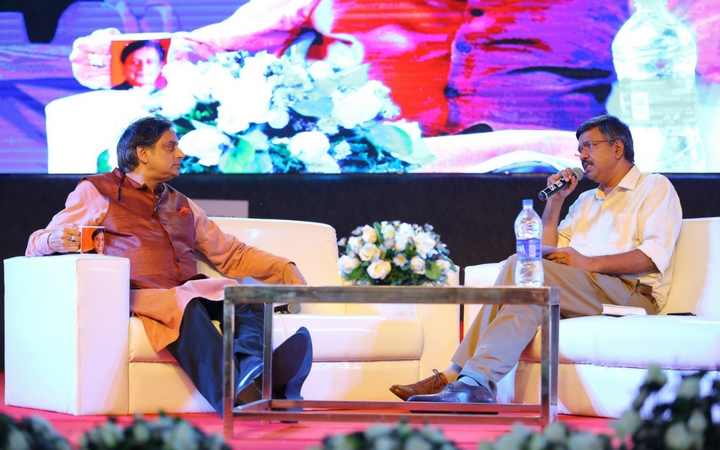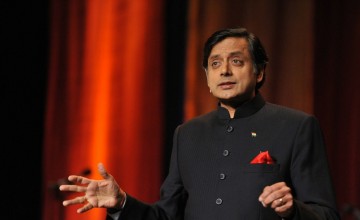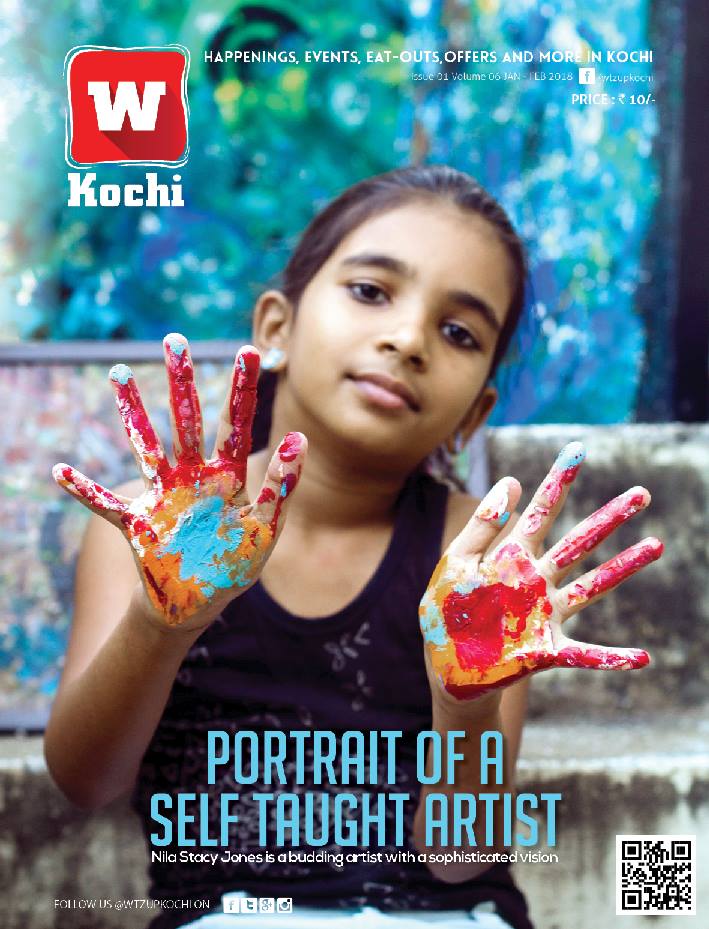Shashi Tharoor charms the audience at Krithi International Book Fair
- 03 Mar 2018
- FWD Admin
- Features
The prolific writer made his appearance at the on-going book fair in a conversation with journalist KJ Jacob to talk about his latest book Why I Am A Hindu
Words by Charishma Thankappan
Photographs from Krithi International Book Fair
The second day of Krithi International Book Fair saw the occasion being graced by Dr Shashi Tharoor in a talk with distinguished journalist KJ Jacob. The conversation was based on Tharoor’s latest book Why I Am A Hindu, published by Aleph Book Company, and was released in January this year.
Receiving widespread acclaim, the book explores Tharoor’s espousal of Hinduism in its original form, as it was meant to be; and its devolvement into Hindutva, as it has come to be today. The author-cum-politician took part in a freewheeling chat at the Changampuzha stage in Marine Drive on Friday evening, and followed it by fielding questions from the audience.
The evolution of the idea of Hinduism
Tharoor said that he felt gratified that many Hindus have read his book. Jacob began the interview by juxtaposing The Discovery of India, written by Jawaharlal Nehru, with Tharoor’s Why I Am A Hindu, written 70 years later. Tharoor responded, “Nehruji had a very open-minded and educated view of Indian culture. He takes Hinduism in a cultural context; he himself was an agnostic. According to him, the so-called interpreters of god did more harm than good. Having said that, he had a tremendous reverence for many aspects of Hinduism and he talked about a deep understanding and respect. I go a little beyond Nehruji. I have taken the trouble to read as much as I can, albeit English translations of the Upanishads. I have read a number of scholarly studies of Hinduism. When Nehruji was writing The Discovery of India, the struggle was against the British. The Hindu Mahasabha was not a force to be taken seriously.” The writer countered his idea of Hinduism as different from Hindutva, which is “the kind of Hinduism that some people want, which is particularly bigoted and pathetically narrow-minded”.
Tharoor’s Why I Am A Hindu opens with a description of how he grew up in a Hindu household, where his father lived as a Nehruvian, practicing the tenets of Hinduism; yet without imposing it upon the young Shashi. “The first half of my book very clearly lays my understanding of my Hinduism. I am being presumptuous enough to use the words ‘my Hinduism’ because I say that every Hindu is entitled to believe whichever aspects of the faith appeal to him and I lay it out in order to stake up my position as a Hindu. It suits the other side to reduce this debate to an argument between good Hindus and godless secularists. So I want to make it clear that I am not a godless secularist; I am a good Hindu and I know as much about the faith.”
The second half of the book, reveals Tharoor, is explicitly political. It is followed by a critique and a section called ‘Taking Back Hinduism’. The wordsmith expounds it as a “need to take back Hinduism for the liberal minded Hindu believers like myself, take it away from the bigoted, intolerant and in very many ways unHindu elements who have been propagating their version of the faith in the name of Hindutva. To me, these people are unHindu because they have actually reduced the soaring majesty of the Upanishads and the Bhagwad Gita. They have reduced it to a badge of identity, rather like the British football hooligan about his team, who says that my football team is the best one and I will hit you on your head if you don’t agree with me. And it galls me that they are actually doing it in the name of great Hindu teachers. They have understood nothing of Vivekananda if they claim to be following in his footsteps when Vivekananada said that mine is a faith that teaches not tolerance but acceptance”.
On secularism and its application to India
On the changing definition of secularism and its application to India, Tharoor said, “In a country like India, religion has such deep roots that you cannot call it as secular in the dictionary sense of the term, so we need to expand the meaning of secular to really mean pluralist. We are a country of plural religions, plural belief systems and all of them coexist; none is privileged by the state.”
Jacob went on to raise the concepts of Unity and Uniformity that Tharoor lays out in his book and probed him about the difference between the two, to which the ink slinger delivered his response without mincing his words. “Unity is a Hindu virtue and uniformity is what the Sangh Parivar professes. Uniformity says that everyone must say ‘Bharat Mata Ki Jay’; that you must stand up and sing Vande Mataram, that you must have a number of outward manifestations of your devotion. But Unity declares that if a Muslim friend says that ‘my interpretation of my religion does not permit me to personify my country as a goddess and worship her; therefore I will say Jay Hind and I won’t say Bharat Mata Ki Jay’, I believe that our constitution grants him that right. To Amit Shah and the RSS, he does not have that right. I was in a conference in Delhi once, where Amit Shah challenged the audience to say Bharat Mata Ki Jay, and asked who wouldn’t say it, and I raised my hand and said that I wouldn’t say it because you demand it.”
Among further deeper discussions into the book and Tharoor’s ideas about various concepts, Jacob asked a pertinent question that perhaps played in the minds of several readers among the audience – if there would be a follow-up to Why I Am A Hindu, which Tharoor declined saying there wouldn’t be a sequel to the book “as this book has to stand by itself”.
On the evolution of his writing
Regarding his writing, Tharoor, who has four book of fiction and 13 books of non-fiction to his name, lamented on his inability to write fiction. “My work has kept me so busy that I haven’t been able to build that world of illusion, that palace of glass, to construct an artificial world of characters and dialogues. But when you are sitting down to write and somebody comes with a nivedanam; that palace of illusion gets broken and easily shattered and so after littering my laptop with half begun manuscripts I decided that it is easier to write non-fiction. And that’s one of the reasons that a lot of my writings have been about the burning issues of our times. Perhaps my next book will be something more political, in time for the next election,” signed off the writer.
Why I am A Hindu is published by Aleph Book Company and is available at Krithi International Book Fair and all leading book stores in Kochi. The book is being translated into Malayalam and Hindi.















